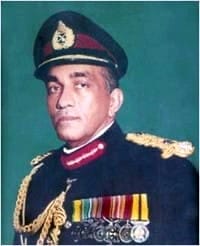76 Years of Honor — An Army That Shapes a Nation
Marking 76 years of the Sri Lanka Army — a tribute to discipline, character, and sacrifice. Beyond defense, the Army stands as a forge of citizens, leaders, and men and women of honor who carry integrity and courage into every field of national life.

October 10, 2025
Seventy-six years ago, on this very day, the Sri Lanka Army was formally established under the Army Act of 1949. It was born from the quiet conviction that a young nation must guard its sovereignty not only with might — but with discipline, compassion, and honor.
Today, the Army stands not merely as a shield of the Republic, but as an institution that forges character — shaping men and women who embody the highest ideals of citizenship and service.
The Soul of an Army: Character, Service & Sacrifice
An army’s strength is not in its armories or its ranks — it is in its people.
Every soldier carries within them the unseen weight of duty — and the silent promise to serve with integrity, restraint, and courage.
- In the final years of Sri Lanka’s conflict, thousands gave their lives so that others might live in peace. Their memory is not just inscribed on stone — it is woven into the conscience of a nation.
- For those who serve and return, the Army remains a lifelong academy of discipline and humility — producing citizens of exceptional character who contribute quietly to civic, business, and community life.
- For every young recruit who enters its gates, the uniform is not a symbol of power — but of service, self-control, and responsibility.
“If a man says he is not afraid of dying, he is either lying or is a Gorkha.”
— Field Marshal Sam Manekshaw
In that humor lies truth: courage is not the absence of fear — it is mastery over it. And it is that inner mastery, the same that built great armies and great nations, that must define our own.
Lessons from Leadership: What Sam Manekshaw Taught the World
Few military leaders articulated the human dimension of command as clearly as Field Marshal Sam Manekshaw, India’s first Field Marshal and one of South Asia’s most respected soldiers.
His lessons remain timeless for any army that seeks to be loved by its people:
“Professional knowledge and professional competence are the main attributes of leadership.”
— Sam Manekshaw
“A ‘Yes man’ is a dangerous man … he can never become a leader nor ever be respected.”
— Sam Manekshaw
Manekshaw believed that true leadership rests not in obedience but in moral courage — the ability to distinguish right from wrong and speak truth, “irrespective of consequences.”
That ethos applies equally to our own armed forces today: excellence begins with conscience.
The Institution We Must Be — For the Nation We Serve
To command public trust and affection, an army must remain disciplined, transparent, and profoundly human. The next generation of leadership must therefore be built on seven enduring pillars:
- Character as Capability
True strength is ethical strength. Every soldier must be trained not only in tactics and technology but in ethics, accountability, and the humane conduct of operations.
- Leadership Development Across Ranks
Leadership must not be the preserve of a few. Mentorship, continuous education, and professional development must extend to every level — officer and enlisted alike.
- Feedback, Accountability & Integrity
After-action reviews and independent inspectorates must function with sincerity. The Army earns trust when it learns publicly and corrects itself with humility.
- Community & National Integration
Through civic service, disaster relief, and public outreach, the Army must remain part of the people’s daily life — not apart from it.
- Honoring the Fallen, Supporting the Families
True remembrance means care — for widows, children, and veterans. The moral debt of service does not end at demobilization; it deepens with time.
- Human-Centric Modernization
As the Army embraces cyber, communication, and unmanned systems, technology must protect soldiers and empower communities, not distance them from either.
- A Culture of Calm Authority
Power must never outgrow humility. Soldiers must be trained to lead with calm, clarity, and respect — for their superiors, their subordinates, and the civilians they protect.
“Give me a man or a woman with common sense and I assure you I can make a leader out of them.”
— Sam Manekshaw
An Army the People Will Always Love
The Sri Lanka Army remains one of the most trusted public institutions in the country — because it has always stood ready. Whether in flood, pandemic, or peacekeeping duty abroad, its role extends beyond defense; it represents the disciplined face of service itself.
But that trust is a living covenant. It must be renewed through transparency, compassion, and professionalism in every generation. The soldier’s weapon may be steel — but their legacy must be moral.
“An army’s reputation is not built on power; it is built on conduct.”
As we honor seventy-six years of duty, let this anniversary mark not only reflection — but renewal.
Let us continue to build an army that the people cherish, because it stands as they stand — strong, just, and human.
76 years honored. A nation’s trust to earn anew.
References & Sources
- Official Sri Lanka Army History – www.army.lk
- Field Marshal Sam Manekshaw quotations – Jagran Josh, SSB Crack, Vikram Karve (Medium)
- Daily News (10 Oct 2025): “76th Anniversary Highlights Army’s Role in Community Service”
- UN Peacekeeping Records – Sri Lanka contributions
- Sri Lanka Army Women’s Corps History – alt.army.lk/slawc
About the Author
Alfie Ameer is the Founder & CEO of Vonfidel Group (VFG), Chair of VONFIDEL K9 and Vonfidel Ranch, and Principal Consultant at Cognisive Consultants.
A former military officer and leadership educator, he writes on leadership psychology, intelligence reform, ethical command, and behavioral science — exploring how trust, discipline, and calm authority shape both people and institutions.
His recent works include “The Science of Calm Authority”, “Between Banners and Shadows”, and “Rebuilding Trust in a World That Teaches Fear.”

